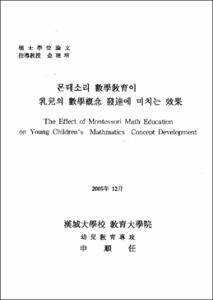몬테소리 수학교육이 유아의 수학개념 발달에 미치는 효과
- Appears in Collections:
- 부동산도시개발·관리전공 > 1. Thesis
- Files in This Item:
-
-
Download
 000000556996.pdf
기타 데이터 / 2.2 MB / Adobe PDF
000000556996.pdf
기타 데이터 / 2.2 MB / Adobe PDF
-
Items in Repository are protected by copyright, with all rights reserved, unless otherwise indicated.